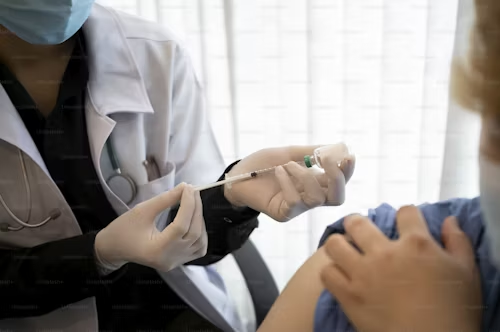5 Things You Should Know about the Yellow Fever Vaccine
Yellow fever is an illness found in areas of Africa, Central and South America and Trinidad, one of the Caribbean islands. Whilst it is not natively found in the UK, it is important to get the yellow fever vaccine if you are travelling to a country where yellow fever is found.
There are numerous facts about the yellow fever jab that is important for people to know, especially if they are planning on travelling abroad where the vaccine is necessary. This includes who can’t have the vaccine, meaning some of these facts must be known before the vaccine is administered. Take a look at our 5 facts that you need to know before you get the yellow fever vaccination.
What is Yellow Fever?

Yellow fever is a disease that is transmitted by mosquitoes and can affect people of any age. There is currently no medicine or cure that can be used to treat yellow fever, and symptoms usually occur within 3 to 6 days of infection. Whilst some people show no symptoms, those who do can experience:
– Fever
– Muscle pain, which can be accompanied by backache
– Loss of appetite
– Headaches
– Nausea and vomiting
Approximately 12% of people who are infected with yellow fever go on to develop more severe symptoms, which can include jaundice. Severe symptoms require hospitalisation to help manage them within a healthcare environment.
If you are suffering from yellow fever symptoms, regardless of whether they are mild or severe, you must speak with a doctor for advice about how to proceed as soon as possible.
List of Facts About Yellow Fever
1) Some countries require you to show proof of vaccination from yellow fever upon arrival through a certificate.

This certificate is called an International Certificate of Vaccination, although it is also known as the ‘yellow card’, and not having this certificate can mean you are denied access into the country you are visiting or are required to quarantine. This is particularly in countries where yellow fever is often found. Some of the countries that require proof of vaccination before entering include:
– Angola
– Burundi
– Cameroon
– Central African Republic
– Republic of the Congo
– French Guiana
– Gabon
– Ghana
– Guinea-Bissau
– Liberia
– Mali
– Niger
– Sierra Leone
– Togo
– Uganda
This list is not exhaustive, and you should speak with your GP if you plan to travel to ensure you gain the yellow fever vaccination if you need to.
2) The yellow fever vaccine provides lifelong protection from the disease for most, but not all people.

The vaccine for yellow fever is very effective and offers lifelong protection for most people who receive it. However, some people need a second booster vaccination to gain this immunity. This can be because the person has a weakened immune system or is living with HIV, before having a bone marrow transplant or if they were previously vaccinated when they were pregnant or under the age of 2 years.
3) Many people cannot have the vaccination.

Whilst the vaccine is effective, it cannot be administered to a lot of people. These people include:
– Babies under the age of 6 months
– Those with weakened immune systems as a result of chemotherapy or radiotherapy
– Those with weakened immune systems as a result of leukaemia or lymphoma
– Those with a close family member who has suffered from a severe reaction to the yellow fever vaccine and has damage to the brain or other organs because of this
– Those aged 60 years or over and are travelling to an area not recommending the vaccine
– Those who are allergic to the vaccine, including those allergic to eggs
– Those who have had their thymus gland removed or have a thymus gland disorder
– Those who have previously had an allergic reaction to the vaccine
Instead, they are required to speak with a doctor about how to proceed.
4) There are side effects that can come from the yellow fever vaccine.

As with many vaccinations, the yellow fever vaccine can come with side effects. The main ones for this specific vaccine are muscle pain, temperature, headaches and pain where the vaccine was administered. A lot of the side effects can be managed using over-the-counter medications, such as paracetamol to help relieve the pain. For muscle pains, there are muscle pain relief sprays and muscle pain relief gels, which can be purchased through the Travel Health Clinic.
5) Yellow fever is spread via mosquito bites.

As previously mentioned, yellow fever is contracted through mosquitoes. However, even if you are vaccinated against this specific disease, mosquitoes can also spread illnesses such as malaria. This means it is important to try and prevent mosquito bites where possible, regardless of your vaccination status.
This can be done by using a mosquito net at night, which will reduce the amount of insect bites you obtain whilst you sleep. You can also wear clothing that covers most of the skin, such as long-sleeved shirts and trousers that can be tucked into your socks or boots. Using insect repellant can also help to prevent mosquito bites, and you should follow the instructions on the label when using the product.
Yellow fever is a disease that can be dangerous, and proper precautions should be taken before travelling to an area where yellow fever is known to be. People suffering from yellow fever need to speak with a medical professional for advice about what to do and how to manage the symptoms.
The Travel Health Clinic offer an array of travel vaccinations for you to access and obtain, ideal for those travelling to countries where harmful illnesses are prevalent. These vaccinations can be booked through local pharmacies, and offer lifelong protection from the infection. Take a look and book your travel vaccinations today.



